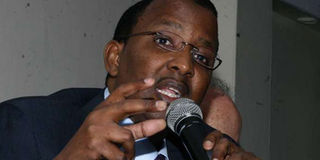Alarm bells sounded on IEBC in elections and human rights congress

IEBC Chairman Issack Hassan. There are some Kenyans — including the voluble chest-thumping and sycophantic Aden Duale — who want the IEBC in its current configuration to remain in office and conduct elections, no matter what. PHOTO | EVANS HABIL | NATION MEDIA GROUP
What you need to know:
- Any small mistake it makes — which is inevitable — will be seen as bias and could trigger the angry expression of public discontent. IEBC has no room for error, which is scary.
- Over the years, the international community has found ways of expressing its disapproval, more or less, with military coups, though this is far from perfect as Al Sisi’s military coup in Egypt evidenced.
- The use of this technology is touted as a way to make the election safer, but questions about the right to privacy and data protection have scarcely been addressed.
The Carter Center in Atlanta, USA, recently hosted an interesting discussion on the nexus between elections and human rights.
Upfront, there seems to be a divergence between the global North and the global South on matters election.
In the South, elections have always been an integral part of the human rights discourse with human rights and democracy groups taking the lead on monitoring, observation and trying to infuse a human rights framework and approach to the management of elections.
Internationally, however, elections are in — in practice — removed from traditional human rights work.
This meeting was part of series to review and renew the relationships between the international human rights community, and the global elections community which includes the “technical assistance” groups such as UNDP, UN Elections Assistance Directorate, and IFES; and international observer groups like Carter Center, NDI, EU, and OSCE.
A number of issues pertinent to Kenya were raised, especially on the role of the election management body which in our case is the IEBC.
It was stressed that these bodies needed, not just legality, but also legitimacy and credibility. This is an issue that worries beyond the pale.
Yes, there are some Kenyans — including the voluble chest-thumping and sycophantic Aden Duale — who want the IEBC in its current configuration to remain in office and conduct elections, no matter what.
But we can’t wish away the fact that every recent poll has the IEBC at approval levels in the 20 percentile region.
And that the chairman was adversely mentioned in the “chicken gate” scandals; or the fact that he expressed clear and open bias in his submissions to the Supreme Court.
CIVILIAN COUPS
All these issues make IEBC a clear and present danger despite its recent “breadcrumb” to Moses Wetang'ula.
Any small mistake it makes — which is inevitable — will be seen as bias and could trigger the angry expression of public discontent. IEBC has no room for error, which is scary.
Oh, the state could decide to “deal” with public discontent by coming out brutally and militaristically.
It may even succeed in quelling this public discontent, but that is not guaranteed as the security forces have the same divisions and fault lines as we do.
But this state response would inevitably put us firmly in the dictatorship category where silence and fear reigned.
The fact that repressive regimes have perfected the art of stealing elections, civilian coups also arose, though there is no adequate response in international law and diplomacy.
Over the years, the international community has found ways of expressing its disapproval, more or less, with military coups, though this is far from perfect as Al Sisi’s military coup in Egypt evidenced.
But civilian coups have still not attracted a common international response, diplomatically or legally.
Importantly, the election technical advisers group agreed that their accountability needed to extend beyond their “client,” the election management body, to the “electorate” that they were ultimately serving.
For many years, many of these advisers have interpreted their accountability as narrowly as possible, and limited to their donors.
PRIVACY AT RISK
Yet with their front row seats, they are witnesses to the malfeasance, negligence, incompetence or bias of the election management body that they should share with the electorate.
An important question was raised on the viability of “diaspora” voting.
By necessity, the regime in power has total control on this voting process and the meeting was regaled with stories of ballots being stuffed in warehouses for the diaspora!
While important that the diaspora has a vote, it is vital that opposition and independent observers find ways to ensure that these votes are not part of the rigging plan for the regime.
Finally, there was an important question raised on the new BVR craze around elections.
The use of this technology is touted as a way to make the election safer, but questions about the right to privacy and data protection have scarcely been addressed.
In other words, are we giving the state private information about us that contravenes our rights to privacy? And what does this mean for our other freedoms?





